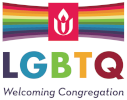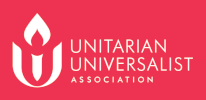AMERICAN UNITARIAN UNIVERSALISM
October 19,2008
REV. DAVID ROBINS
Historian David McCullough wrote: “History is a guide to navigation in perilous times. History is who we are and why we are the way we are.”
Every UU minister has a different perspective on who we are and why we are the way we are.
One of the reasons is because we have no organizational paper trail from two thousand years ago to the Unitarian Universalism of today. We have a paper trail for over 400 years of Unitarianism and a paper trail for over 200 years of Universalism. Before the paper trail, you need to look at the trail of ideas, the conflict of ideas, and the repression of ideas. The Unitarianism and Universalism whose roots are Christian stressed Jesus’ humanity, God’s unity, God’s love, universal salvation, and non-creedal religion.
Today, these ideas remain among the important ideas in UUism along with freedom of thought in religious matters, disagreement without repression, an openness to spiritual and religious innovation, and a practice of loving, ethical living.
These ideas form the framework in which we may live our religious journeys within the protection of our UU identity.
As religious free-thinkers and free spirits, we also trace our roots to people in all ages who cast aside enforced conformity and doctrine. We share a living tradition that calls us to bring our faith into the world, to share it with others in order to light the way and lighten the burden. The sources of our living tradition are many…..today’s expression of love, yesterday’s poem, ancient ritual, prophetic words, deeds that hearken.
“Direct experience of a transcending mystery and wonder, affirmed in all cultures, which moves us to a renewal of the spirit and an openness to the forces that create and uphold life.
“Words and deeds of prophetic women and men that challenge us to confront powers and situations of evil with justice, compassion, and the transforming power of love;
“Wisdom from the world’s religions which inspires in our ethical and spiritual living;
“Jewish teachings and Christian teachings that call upon us to respond to God’s by doing justly and loving our neighbor;
“Humanist teachings which counsel to heed the guidance of people reasoning equally together, and the results of science, and warn us against idolatries of mind and spirit. (UUA Purposes and Principles)
Ours is a religious pluralism which enriches and ennobles our faith. This living tradition inspires us to deepen our understanding and expand our vision.
There is a living tradition of those who called themselves Unitarians and Universalists. The name Unitarian first appeared in a small, independent nation called Transylvania in the 1500’s. These small, largely rural, independent Christian churches which became Unitarian Christian churches developed because of two fundamental changes. One, the invention of technology which created the printing press. Bibles were mass produced for the first time in history. Second, the determination of a small number of teachers who could teach others how to read. These Christians read the Bible and decided for themselves that God was a Unity rather than a Trinity. Never doubt that the creation of new technology, or new knowledge, no matter how simple can change people. Never doubt that the simple practice of one person teaching others to read can change people’s lives. Today, there are over 100,000 Unitarian Christians in Eastern Europe in 500 churches. They worship on Sunday in rural churches decorated with motifs from agriculture. . They pray the Lord’s prayer, take communion, and hear sermons from ministers trained in a recently reopened seminary.
Universalism as an organized religion began in the states with the landing of Englishman, John Murray in 1770. Murray was a complete failure in life. As a preacher of Universalist theology in England, he was hounded out of churches and towns. He was jailed repeatedly. He was so filled with the spirit of this soul saving message that he rarely worked long enough anywhere to make a living. While in debtor’s prison, his wife and child died. In shame and failure he sailed to America, his faith muffled, his dignity shattered, a cloud of shame hanging over him. The first person he met in New Jersey, begged him to preach a message of universal salvation in a small local chapel. Having vowed never to preach again, Murray at first refused, but then relented, and thus began decades of preaching the healing message of God’s universal love. Never doubt that the truth that you hold inside you about human dignity, love, and justice, even in the face of failure, or shame, or ridicule, is the Truth that will heal yourself and others, and set you and others free from fear.
Our living tradition draws from Michael Servetus, a Spaniard, who was a physician, marked for death by the inquisition in the 1500’s for his belief in the Unity of God and a rational approach to the Bible. He was eventually put to death by John Calvin in Geneva.
Our tradition draws from George De Benneville, another physician who was banned from his church in 1720 for believing in universal love and salvation. He practiced medicine near Philadelphia for 50 years, doctoring to others out of the love he felt from his God, and speaking his truth of love at every opportunity.
Our living tradition draws from Louisa May Alcott, a Unitarian and the daughter of a failed radical schoolmaster, disorganized writer, and occasional lecturer, commune founder. With her mother’s steady hand, she developed into a one of the most famous and beloved authors in American history.
Our living tradition draws from Susan B. Anthony, a Universalist, a New York school teacher, and the organizing genius behind the women’s suffrage movement. Time and again, over decades, she heard others say that women should not have the right to vote, but she didn’t let those voices snuff the inner flame of what she knew to be true.
Our living tradition draws from Malvina Reynolds, a blues singer and composer of folk songs, who saw an ironic and sad truth in the building trend toward sub-divisioning so much of America, in her song, “little boxes in a row…”
Our living tradition draws from Abiel Abbot, the first Unitarian minister here, who was hounded out of his Connecticut church for being too theologically liberal.
Of course, I want to lift up the most stirring and encouraging examples of our living tradition. We have some pretty low moments too, such as when a Unitarian helped found the Ku Klux Klan in the 1800’s. Today, I think that the low end of our living tradition is the habit of keeping quiet about being a Unitarian Universalist, and not wanting to draw attention to ourselves. Every time is time for our saving faith.
The history I have been talking about that represents our religious tradition is interesting, even exciting and inspiring at times, but it is the past. We should set the present as high as the past. This year we will do everything we can to bring the church fully alive, reach its potential, surpass our expectations, walk our talk, and talk openly about our walk, not just unafraid to be a UU but proud to be a UU and comfortable with our inner truth.
This year, the present, may we listen for the opportunities to calmly let the truth of our conscience provide for leadership and for cooperation in the community.
This year, the present, may the spark of love given to us and chosen by us, listen for opportunities for ministry among us and in the community.
The past, our living tradition is not enshrined, but is made up of once real, struggling human beings like us, on whose shoulders we now stand.
The future should not be a cause for anxiety but rather glimpses of possibilities that ignite our enthusiasms, and help to create a reasonable and good today.
We have much religious history of which to be proud, and I plan to preach about this tradition through the year. When I listen to the past, I hear it say many things to me. I hear it say that each generation of Unitarian and Universalists in our tradition believed in something larger than themselves, whether it was a personal God, a cosmic God, a spirit or power, higher principles, or universal ethical imperatives. Each generation listens to their conscience, believes in a love that struggles with the world, and melds together the best ideas of the past with the ideas and knowledge of the present, in order to lift up human understanding, freedom, and love. Today, we are no different.
While it is important to know something of our own living tradition and history, it is more important to be engaged in the making of our own living tradition and history.
Jack Mendelsohn offers this perspective on our history and future (adapted by Rev. Jane Rzepka):
We have inherited quite a religion.
It is lived.
It is a serious effort to conduct life according to principles and ideals.
It is emotional, heart-swelling.
It is occasionally naïve.
In spite of uncertainty, it does not rule out leaps of faith.
It is free, not bound by tradition.
It is first hand, a personal experience.
It is responsible. It does not try to escape the consequences of decision.
It is growing. It never thinks of itself as perfected and final.
It embraces humility, recognizing that faith is not certainty where there is in fact mystery.
It is compassionate. It is tough on its possessors, committing them to sacrifice, but it is tender toward those who disagree.
It is social, struggling to realize its own vision of the world.
It is radiant, open to grace, inviting courage, serenity and enthusiasms.
This is our history and also our hope.


